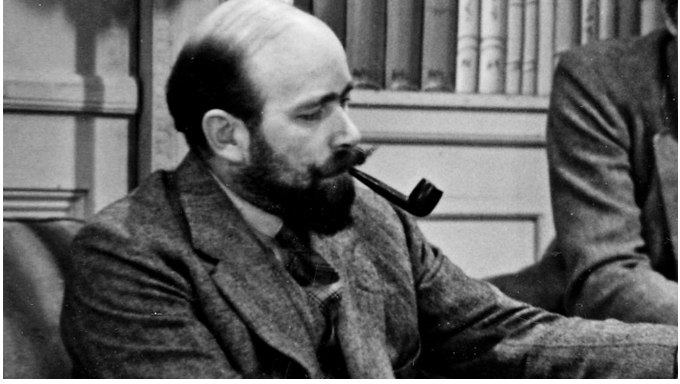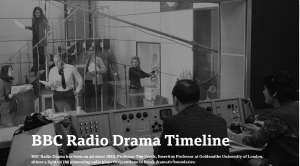Experimental Radio: Celebrating the 100th anniversary of The Comedy of Danger
EMERITUS PROFESSOR TIM CROOK, GOLDSMITH UNIVERSITY OF LONDON

Richard Hughes seen in a BBC TV studio in the 1930s.
Description
The poet, playwright and novelist Richard Hughes (1900-1976) was only 23 in January 1924 when he was asked by the theatrical producer Nigel Playfair to write a play for effect by sound only, in the same way that film plays are written for effect by sight only. Playfair had been commissioned by the early BBC to put together an evening of playlets experimenting with the new radio medium.
Hughes specialised in writing the then fashionable genre of grand guignol, which combined horror and thriller to entertain. He had been listening to radio drama and had started writing something over Christmas. He offered to have something for Nigel Playfair the following morning. What he produced overnight was a work of genius. The title The Comedy of Danger was ironic and it would later be called by the single word Danger.
A young man and woman, Jack and Mary are taken down a Welsh coal mine by Mr Bax, an elderly man with a gruff voice. All three are plunged into an intense action drama when the lights go out, then there’s an explosion and finally the mine floods with water. Will they die and experience their last moments in complete darkness or will they escape and be rescued? A claustrophobic disaster and horror mise en scène full of drama and suspense ensued.
The play captured the imagination of the listeners and the broadcast was a triumph. The disaster plot was topical: 344 men died in the Pretoria Pit disaster in Lancashire in 1910 after an underground explosion at the Hulton Colliery near Bolton; In 1913, 439 miners perished at the Senghenydd Colliery Disaster in Glamorgan. The haunting sound in the play of Welsh miners singing to console themselves in the darkness of the pit was powerfully resonant.
After 'A Comedy of Danger', Richard Hughes wrote four more radio plays, including Congo Night, broadcast once in 1924 and became known mainly for his novel A High Wind in Jamaica.
Hughes will always be remembered for turning out the lights at the beginning of his play Danger and lighting up the future of radio and audio drama.
This playlist contains the only existing broadcast materials by Hughes, including a 1974 recorded version of the original from 1924. Danger was produced at least 13 more times during the 20th century. For further information you can visit Professor's Crook brilliant section on Richard Hughes at kultura press.

Curator
Emeritus Professor Tim Crook, Goldsmith University of London
Subject
Broadcast Radio
Keywords
BBC Radio, early radio broadcasts, experimental radio dramas, experimental storytelling, miners, Richard Hughes